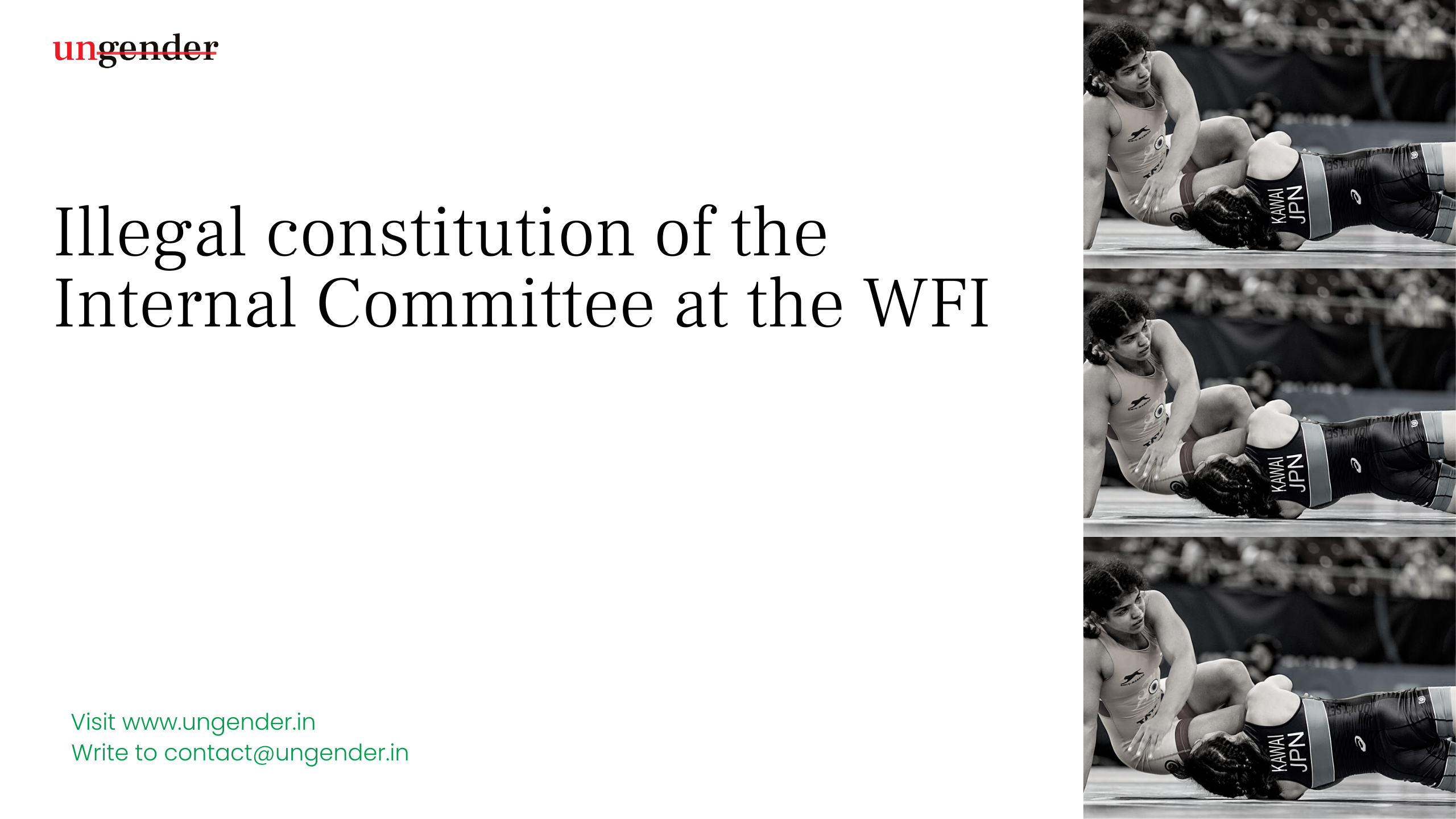All of us are pretty much aware of the recent allegations that Indian wrestlers including Vinesh Phogat and Sakshi Malik have made Wrestling Federation of India (WFI) president Brij Bhushan Sharan Singh and other coaches of sexually harassing female wrestlers.
As an HR leader or a corporate professional, you might think that this incident has nothing to do with you. However, the incident has shed light on the illegal constitution of the Internal Committee at the WFI.
Here is why this affects you also:
- Like is stated earlier, the WFI’s IC is a masterclass on how not to constitute the IC under the PoSH Act, 2013,
- Where do companies often go wrong while constituting the IC?,
- What is the legally compliant way of constituting the IC?
At Ungender, incidents like these intrigue and bother us not just because they’re grave allegations of sexual harassment against a person in power but also because they put a spotlight on the blatant violation of the PoSH Act, 2013.

A basic guide to forming the IC for your company
The IC, Internal Complaints Committee (ICC), or the PoSH Committee acts as a redressal body for any complaint filed against workplace sexual harassment in your company.
Forming the IC is the responsibility of the employer and perhaps the most crucial one. Under Section 4 of the PoSH Act, 2013, the law lays down certain guidelines for the composition and constitution of the IC.
As an HR professional, employer, or leader in your workplace, here are 4 basic points you need to keep in mind while constituting the IC for your company:
- Your IC should be headed by a senior-level female employee,
- An external member should be nominated to act as a neutral party in your IC,
- It should have at least 4 members including the external member, and
- At least half of the members of your IC should be women.
It is important that you and your company pay attention to these basic guidelines of IC composition and constitution to avoid legal consequences.
In news: Wrestling Federation of India and sexual harassment allegations.
Why am I writing this post?
To all the Working Professionals- please go and see the Internal Committee of your organization and ask the questions to the leadership if it isn’t constituted properly: pic.twitter.com/9nEFsmHtV4— Pallavi Pareek (She/They) (@PallaviPareek) January 20, 2023
Where can you go wrong while forming your IC?
Improper or non-implementation of the PoSH Act, 2013 is scarily common. Some companies do not heed what the law says about IC formation and why it says so (we’ll talk about this later).
What is important is that some of the below-mentioned mistakes are avoided at all costs to ensure that your IC is legally compliant, aware of its role, and well-equipped to perform its responsibilities.
Here is what you need to avoid while forming your IC:
- It cannot be chaired or headed by a male member,
- No promoters or perceived owners/top most authority members should be part of your IC,
- At no point, your IC should have more male members than the female, and
- Your external member should be independent, not a part of your company, and should not have any vested affairs in the organization.
You need to take a look at the IC formation in your company and reconstitute it if you notice you have made any of the above mistakes.
Where did the WFI go wrong with its IC?
Coming to the composition of the WFI’s IC, on their website we can see that several essential components of the IC constitution are not aligned as per the PoSH Act, 2013. These are:
- Male Chairperson,
- More male members than females,
- No external member.

Why is the IC constituted in such a way?
A question that a lot of companies (and even you) might have is why you need to constitute the IC in a way as laid down in the law.
Apart from the obvious answers being ‘to avoid legal consequences’ or ‘to constitute a legally compliant IC,’ there are also reasons behind why the law intended the IC to be constituted in such a manner. These are:
To maintain autonomy: As an independent body to receive, investigate, and extend decisions on sexual harassment complaints, it is crucial that it remains un-influenced.
To maintain an unbiased approach: While the external member is absolutely independent, internal members are still the employees of the organization. That is why the external member’s presence is mandatory in all affairs.
To maintain transparency: It cannot exist and function in hiding or isolation without disclosing its existence and ways of functioning.
Conclusion
As a working professional, it is important for you to see what your Internal Committee looks like and whether its composition is in accordance with the law or not. The IC plays a significant role in preventing and redressing workplace sexual harassment, perhaps even the most crucial. It is significant that its constitution is in compliance with the law.
Also read: Sexual Harassment in Sports in India
How can Ungender help you?
At Ungender, our team of experts provides you with the best legal advisory when it comes to establishing the IC in your organization. Whether they are legal mandates or the best industry practices, we make sure that your IC is compliant with the PoSH Act, 2013. We also ensure their continuous learning and capacity building.
Write to us at contact@ungender.in to build a safe workplace for your team.










